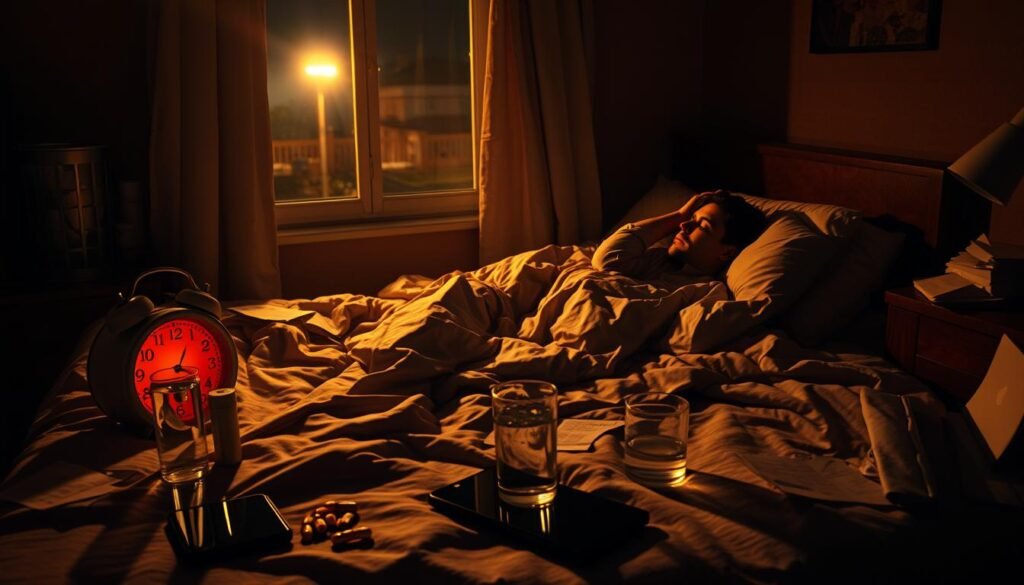About 50 to 70 million people in the U.S. face chronic sleep problems. This shows how common insomnia is, touching many lives. Many seek medicines for insomnia, like sleep aids and sleeping pills, to sleep better. We’ll guide you through the various treatment options, from prescriptions to natural aids. Learn about effective insomnia treatments. Check out this resource for natural sleep help.
Key Takeaways
- Insomnia affects millions, making it the most common sleep disorder.
- Doctors often recommend lifestyle changes or sleep aids for effective insomnia treatments.
- Prescription sleeping pills are typically meant for short-term relief.
- Chronic insomnia can pose serious health risks, including heart disease and diabetes.
- A combination of treatments may be necessary for resistant forms of insomnia.
- Natural supplements, like melatonin, may help regulate sleep patterns.
- Creating a sleep-friendly environment and sticking to a routine can improve sleep quality.
Understanding Insomnia
Insomnia means you have trouble falling or staying asleep. Or you can’t get restful sleep. It leads to feeling tired during the day and can make you moody. Knowing the difference between acute and chronic insomnia is key. Acute insomnia often comes from stress and doesn’t last long. Chronic insomnia lasts over three months and affects your life greatly.
For treating insomnia, Cognitive Behavioral Therapy (CBT) is often recommended first. Studies show CBT might work better than sleeping pills. It teaches behaviors that solve insomnia’s root causes. This is especially helpful for long-term insomnia sufferers.
Insomnia can trigger other sleep disorders, making it hard to keep a normal sleep cycle. Before trying treatments, see a doctor. Your doctor can suggest the best treatment for your insomnia symptoms.
| Type of Insomnia | Description | Treatment Options |
|---|---|---|
| Acute Insomnia | Short-term sleep difficulties, usually linked to stress or changes in environment. | CBT, lifestyle adjustments |
| Chronic Insomnia | Persistent sleep disruptions lasting longer than three months. | CBT, possible medication, professional evaluation |
Common Causes of Insomnia
Knowing why you can’t sleep is key to fixing the problem. Emotional stress and mental health issues like anxiety and depression are big reasons. These can really mess up how well you sleep. Other health problems, like chronic pain or trouble breathing, can also make it hard to sleep.
Lifestyle choices matter too. Drinking too much caffeine, not sticking to a bedtime, or not moving much can affect your sleep. Eating big meals late at night doesn’t help either. It can make insomnia worse.
Sometimes, insomnia sticks around for a long time. It can be due to ongoing stress or changes in your daily life. If it lasts more than three months, it’s often linked to deeper emotional or health issues. Age plays a role too, as sleeping patterns change when people get older.
Kids and teens have their own sleep issues, often from staying up late or not wanting to go to bed. Women might have insomnia because of hormone changes during certain times of their life. Knowing these causes is the first step in finding the right help and treatment.
To tackle insomnia, it’s important to understand how all these factors play together. Getting professional advice is key to finding out why you can’t sleep. For more info on how to manage insomnia, check out resources that cover both medical conditions and lifestyle habits. This insight is critical for improving your sleep health.

Medicines for Insomnia
Insomnia can be tough, but various medicines are available. There are three main types: prescription sleeping pills, over-the-counter remedies, and natural supplements. Each option has its benefits, depending on your specific needs.
Prescription Sleeping Pills
Many people use prescription medicines for insomnia. These include benzodiazepines like alprazolam, lorazepam, and temazepam. They help you fall asleep and stay asleep. Another group, non-benzodiazepine hypnotics like zolpidem and eszopiclone, are great for short-term issues. Plus, ramelteon works with your natural sleep cycle.
Some antidepressants and antipsychotics can also aid sleep. They have a calming effect. However, it’s key to talk with a healthcare provider before starting them, to avoid side effects.
Over-the-Counter Sleep Remedies
Looking for something without a prescription? Over-the-counter options like diphenhydramine are available. Found in Benadryl, it’s suited for short-term use. melatonin supplements can also help regulate your sleep cycles. They’re a go-to for many.
Natural Sleep Supplements
For a holistic approach, try valerian root or chamomile. These natural supplements work best with lifestyle adjustments. They aim to improve sleep quality. Remember to consider your health and preferences when picking the best option for you.
| Medicinal Category | Examples | Usage Type |
|---|---|---|
| Prescription Sleeping Pills | Benzodiazepines, Non-benzodiazepine hypnotics, Melatonin receptor agonists | Short-term and long-term |
| Over-the-Counter Sleep Remedies | Diphenhydramine, Melatonin | Short-term |
| Natural Sleep Supplements | Valerian root, Chamomile | Long-term |
Types of Prescription Sleep Medications
Prescription sleep medications can help those with insomnia. Different types serve different needs. It’s key for doctors to carefully assess each patient. Knowing about the available medications helps patients make good choices for their sleep health.
Commonly Prescribed Medications
Commonly prescribed medications come with their own benefits and risks. Some of the notable ones include:
- Daridorexant (Quviviq)
- Eszopiclone (Lunesta)
- Lemborexant (Dayvigo)
- Suvorexant (Belsomra)
- Temazepam (Restoril)
- Zaleplon (Sonata)
- Zolpidem (Ambien, Edluar, Zolpimist)
- Zolpidem extended release (Ambien CR)
- Doxepin (Silenor)
- Ramelteon (Rozerem)
- Triazolam (Halcion)
These meds may cause dependence, especially Z-drugs and benzodiazepines. Safety is crucial, especially for older adults or those with certain health conditions.
Short-Term vs Long-Term Use
Short-term use and long-term use of sleep medications are different. Short-term medicines are for brief insomnia. Long-term treatments are for ongoing issues. Here is a look at some differences:
| Medication Type | Use Duration | Examples | Dependence Risk |
|---|---|---|---|
| Short-Term | Up to 4 Weeks | Temazepam, Zolpidem | High |
| Long-Term | Ongoing (if needed) | Doxepin, Ramelteon | Lower |
Patients should talk to their doctors to learn how to use these meds correctly. Regular check-ins can help adjust treatments and lessen side effects.

Risks and Side Effects of Sleeping Pills
Prescription sleeping medications can help those with insomnia. But, there are risks and side effects to know about. Understanding these is key for safe use, especially as many Americans deal with insomnia.
Potential Side Effects of Prescription Medications
Prescription sleeping pills can cause side effects. These include balance problems, dizziness, and daytime drowsiness. Unusual dreams are also common.
- Balance problems
- Dizziness
- Daytime drowsiness
- Unusual dreams
Sometimes, severe issues like parasomnias happen, leading to sleepwalking or sleep driving. Mixing sleeping pills with alcohol or opioids increases overdose risks. Those with health issues like kidney disease or heart problems should be extra careful.
Managing Side Effects of Insomnia Medications
Dealing with side effects properly can lower risks. Talk openly with doctors about any negative effects. Knowing when to take sleep aids ensures enough rest without feeling groggy later. Aim for 7 to 8 hours of sleep after taking a pill.
Reducing side effects may mean looking at alternatives like therapy or lifestyle adjustments. These can improve sleep and manage side effects from medications. Always talk to a doctor before making changes to ensure a safe and effective plan.

| Side Effect | Description | Management Strategies |
|---|---|---|
| Dizziness | A sense of unbalance or lightheadedness | Stay hydrated and avoid sudden movements |
| Daytime Drowsiness | Excessive sleepiness during waking hours | Limit use to only when sufficient sleep time is available |
| Parasomnias | Unusual behaviors while asleep, like sleepwalking | Secure the sleeping environment; consult a doctor |
| Allergic Reactions | Symptoms like hives, swelling, or difficulty breathing | Seek immediate medical assistance if these occur |
Non-Medical Treatments for Insomnia
Looking for ways to fight insomnia without medicine can really improve your sleep and how you feel. Using cognitive behavioral therapy for insomnia (CBT-I) can change the bad thoughts and actions related to sleep. Also, practicing good sleep hygiene helps make a better sleeping environment.
Cognitive Behavioral Therapy for Insomnia
Cognitive behavioral therapy for insomnia works to fix the negative thinking that hurts our sleep. This method uses different strategies, such as:
- Identifying bad thoughts about sleep.
- Setting a regular time to go to bed.
- Doing relaxation exercises to calm down before bed.
Studies show that CBT-I improves sleep for a long time. This makes it a great choice for those having trouble sleeping.
Sleep Hygiene Techniques
Using sleep hygiene methods can make cognitive behavioral therapy even better. These steps include:
- Keeping a stable sleep schedule.
- Having a cozy sleep space with the temperature set between 65 and 72 degrees Fahrenheit.
- Staying away from things that wake you up before bed, like electronics or caffeine.
- Doing regular exercise to help you sleep better.
Following these tips can really help with sleep. Looking at and changing your daily routines is key to better sleep health. Since over 60 million Americans have issues with sleep, using cognitive behavioral therapy and good sleep hygiene is a powerful non-medical solution.
Lifestyle Changes to Improve Sleep
Making intentional changes in life can greatly boost your sleep. It’s important to exercise regularly. Working out, especially early in the day, matches your body’s internal clock. This prepares you for a better night’s sleep.
Managing your daytime habits is crucial too. Avoid having big meals two hours before bed. Big meals can mess with your sleep due to discomfort or digestion issues. Also, cutting back on caffeine and nicotine later in the day will help. They can mess with your sleep signals.
Having the right environment for sleep is key. Make sure your bedroom is dark, quiet, and cool. You should also turn off screens an hour before bed. The light from devices can make it hard to fall asleep.
Eating foods high in fiber and low in bad fats and sugars is good for deeper sleep. Carefully choosing what to eat can make a big difference. For more tips, click here: exploring dietary changes might help you understand food’s impact on sleep.
Going to bed and getting up at the same time every day can make your sleep better. Also, practicing things like writing down what you’re thankful for can lower stress. This leads to a more restful sleep.
| Tip | Description |
|---|---|
| Regular Physical Activity | Engaging in consistent exercise helps regulate sleep patterns. |
| Avoid Heavy Meals | Refrain from eating large meals within two hours of sleeping. |
| Limit Caffeine and Nicotine | Reducing intake of stimulants, especially later in the day, promotes better sleep. |
| Create a Sleep-Conducive Environment | A dark, quiet, and cool bedroom supports restful sleep. |
| Establish a Sleep Routine | Going to bed and waking up at consistent times helps train the body’s sleep cycle. |
| Practice Relaxation Techniques | Methods like mindfulness or journaling can alleviate stress, enhancing sleep quality. |
When to Seek Professional Help for Insomnia
Up to 30% of adults struggle with insomnia. It becomes a big problem when it messes with daily life. If sleep doesn’t improve after a month of trying on your own, it’s time to get professional help.
Insomnia can be caused by many things like pain, sleep apnea, anxiety, and depression. Stress at work or home makes it worse. Women and older people are more likely to have trouble sleeping. It’s important to get help early to sleep well again.
Seeing a sleep specialist can really help. Cognitive behavioral therapy works well for many. It helps 50% to 70% of people with chronic insomnia without using drugs.
If you don’t sleep enough, you risk serious health problems. This includes obesity, diabetes, and heart disease. If you’re not getting 7 to 9 hours of sleep, see a doctor. Treating insomnia effectively can improve your overall health.
| Symptoms of Insomnia | Actions to Consider |
|---|---|
| Difficulty falling asleep | Seek professional help for evaluation |
| Waking up frequently during the night | Consult a sleep specialist for treatments |
| Feeling tired despite adequate sleep | Consider cognitive behavioral therapy as a treatment option |
| Chronic stress impacting sleep | Explore non-drug treatments |
| Experiencing mood swings or irritability | Discuss symptoms with a healthcare provider |
Conclusion
Better sleep starts with understanding insomnia and exploring a mix of treatments. Many people deal with disrupted sleep for a long time. By combining medical treatments, like benzodiazepines, and non-medical ones, like cognitive behavioral therapy (CBT-I), effective relief is possible. It’s vital for those affected to acknowledge their specific sleep needs and seek tailored advice from healthcare experts.
Adopting a holistic approach helps too. This approach includes lifestyle changes, maintaining proper sleep hygiene, and behavioral therapy. Though pills can help, they may not be the best choice long-term, especially for the elderly. Solutions like CBT-I and good sleep hygiene practices often yield better sleep quality and happiness than drugs do.
Being informed and proactive about sleep health allows people to make smart choices for beating insomnia. Improving sleep isn’t just a goal—it’s critical for a fulfilling life. Thus, finding and applying the right treatment options is essential for everyone’s health and happiness.